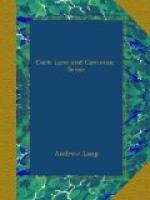This is what we expect; but anthropology, never glancing at our ‘survivals,’ never interrogating them, goes to the Aquarium to study a friendly Zulu. The consistency of this method laisse a desirer! One says to anthropologists: ’If all educated men who have had, or believe they have had “psychical experiences” are mere “survivals,” why don’t you friends of “survivals” examine them and cross examine them? Their psychology ought to be a most interesting proof of the correctness of your theory. But, far from studying the cases of these gentlemen, some of you actually denounce, for doing so, the Society for Psychical Research.’
The real explanation of these singular scientific inconsistencies is probably this. Many men of science have, consciously or unconsciously, adopted the belief that the whole subject of the ‘abnormal,’ or, let us say, the ‘psychical,’ is closed. Every phenomenon admits of an already ascertained physical explanation. Therefore, when a man (however apparently free from superstitious prejudice) investigates a reported abnormal phenomenon, he is instantly accused of wanting to believe in a ’supernatural explanation’. Wanting (ex hypothesi) to believe, he is unfit to investigate, all his conclusions will be affirmative, and all will be worthless.
This scientific argument is exactly the old argument of the pulpit against the atheist who ’does not believe because he does not want to believe’. The writer is only too well aware that even scientific minds, when bent on these topics, are apt to lose balance and sanity. But this tendency, like any other mental bad habit, is to be overcome, and may be vanquished.
Manifestly it is as fair for a psychical researcher to say to Mr. Clodd, ’You won’t examine my haunted house because you are afraid of being obliged to believe in spirits,’ as it is fair for Mr. Clodd to say to a psychical researcher, ’You only examine a haunted house because you want to believe in spirits; and, therefore, if you do see a spook, it does not count’.
We have recently seen an instructive example. Many continental savants, some of them bred in the straitest sect of materialists, examined, and were puzzled by an Italian female ‘medium’. Effects apparently abnormal were attested. In the autumn of 1895 this woman was brought to England by the Society for Psychical Research. They, of course, as they, ex hypothesi, ‘wish to believe,’ should, ex hypothesi, have gone on believing. But, in fact, they detected the medium in the act of cheating, and publicly denounced her as an impostor. The argument, therefore, that investigation implies credulity, and that credulity implies inevitable and final deception, scarcely holds water.
One or two slight corrections may be offered here. The author understands that Mr. Howitt does not regard the Australian conjurers described on p. 41, as being actually bound by the bark cords ‘wound about their heads, bodies, and limbs’. Of course, Mr. Howitt’s is the best evidence possible.




